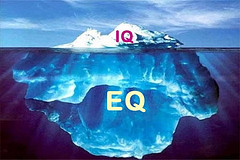 I have written before about identifying how Emotional Intelligence (EI) can help in your current role.
I have written before about identifying how Emotional Intelligence (EI) can help in your current role.
It also applies to other aspects of your professional life including career management, team work, working with customers/suppliers and leadership roles.
EI & leadership
“The fundamental task of leaders is to prime good feeling in those they lead” says Goleman. Great leadership works through emotions not just strategy, vision and powerful ideas. Success depends on ‘how’ they do it. In my experience this is certainly true for managing change.
EI and personal success
How does this EI approach apply outside of work? What relationships might you have outside of work where this could apply?
Family, parent, daughter, son, partner, friend, neighbour, community, schools, clubs, societies, church etc. Are these worth investing some thinking time and action to improve and develop?
The 4 minute rule story
I want to finish off by telling you a great story I heard on the radio.
Steve McDermott, a motivational speaker, asks how do people regard you? Do they want to see you or see the back of you? He suggests the following way of looking at yourself: 10 minutes before you are about to arrive at work or at home ask yourself:
- How would the best Salesman/Manager/etc act when they arrive at the office?
- How would the best Mum/Dad in the world act when s/he arrives home?
You only have to act this out for 4 minutes before the people you are mixing with will react to you positively, which fuels you to continue and so on without having to try. Tap into your emotion, use your energy, think of some things to say and do, and listen for just 4 minutes and make someone’s day.
I rather like this way of summing up what EI is all about: “All the knowledge and skills in the world are no use without the right attitudes and good habits.”
How can you use EI to be more successful? Tweet

